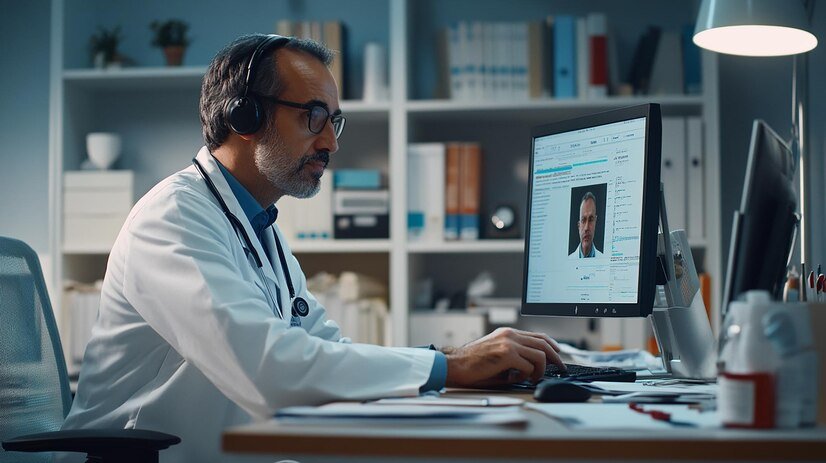In the rapidly evolving healthcare landscape, the role of a virtual receptionist healthcare has emerged as a critical component in enhancing patient experience. As practices aim to provide more efficient and patient-centered services, virtual receptionists offer a scalable solution that addresses the demands of modern healthcare environments. This article delves into virtual medical receptionists’ multifaceted roles and benefits, demonstrating how their integration can lead to improved patient satisfaction, streamlined operations, and better overall healthcare delivery.
Understanding the Virtual Medical Receptionist
A virtual medical receptionist operates from a remote location, utilizing advanced communication technologies to manage various administrative tasks within a medical practice. These tasks include scheduling appointments, answering patient inquiries, managing patient records, and facilitating communication between patients and healthcare providers. Unlike traditional receptionists, virtual receptionists can provide these services without being physically present in the medical office, ensuring continuity and support regardless of geographical constraints.
Benefits to Patient Experience
Improved Accessibility:
One of the primary advantages of having a virtual medical receptionist is increased accessibility for patients. With extended hours of operation, virtual receptionists can cater to patient inquiries and schedule appointments beyond the standard office hours. This flexibility is particularly beneficial for working patients who may find it challenging to reach out during traditional business hours.
Personalized Communication:
Virtual receptionists are trained to engage with patients in a friendly and professional manner. They can provide personalized communication that addresses individual patient needs, fostering a sense of connection and understanding. This customized approach enhances the overall patient experience, as patients feel valued and understood.
Efficient Appointment Scheduling:
A virtual medical receptionist efficiently manages appointment scheduling, reducing patient wait times. Advanced scheduling software allows them to streamline the process, ensuring that patients can secure appointments that fit their schedules. Reducing administrative errors related to scheduling can also enhance patient satisfaction and reduce frustration.
Effective Management of Patient Queries:
Patients often have questions regarding their treatments, medications, or follow-up care. Virtual receptionists are equipped to handle such inquiries efficiently, providing accurate information and guidance. This proactive approach to addressing concerns helps alleviate patient anxiety, and fosters trust in the healthcare provider.
Enhanced Data Management:
With robust systems to handle patient records, virtual receptionists ensure that information is accurate, up-to-date, and easily accessible. This efficient data management enhances the overall workflow within a practice, reducing the likelihood of errors and improving patient care quality.
Building Trust Between Patients and Providers
Trust is a fundamental component of the patient-provider relationship. Virtual medical receptionists play a significant role in building this trust by diligently communicating and ensuring that patient concerns are addressed promptly. When patients feel their needs are prioritized, they are more likely to establish a lasting relationship with their healthcare providers.
Streamlining Operations for Healthcare Providers
In addition to enhancing patient experience, virtual medical receptionists contribute to the operational efficiency of healthcare practices. By offloading administrative tasks, healthcare professionals can dedicate more time to patient care. This shift improves staff morale and leads to better patient outcomes.
Cost-Effectiveness:
Employing a virtual medical receptionist can lead to cost savings for healthcare practices. Businesses can reduce overhead costs associated with maintaining a physical receptionist, such as space, utilities, and equipment. This financial flexibility can be redirected toward improving patient care or expanding services.
Focus on Core Responsibilities:
With essential administrative tasks managed by virtual receptionists, medical professionals can concentrate on their core responsibilities—providing high-quality patient care. This focus can improve patient health outcomes, as providers have more time for thorough evaluations and treatments.
Analytics and Reporting:
Many virtual receptionist services offer reporting and analytics tools that help medical practices track metrics related to patient interactions, appointment scheduling, and overall improvements in office operations. By analyzing this data, practices can identify areas for further enhancement and streamline workflows.
Adapting to Technological Advancements
Technology integration in healthcare has transformed traditional practices, making them more efficient and responsive to patient needs. Virtual medical receptionists utilize various digital tools and platforms to manage tasks effectively. These advancements enable seamless communication between patients and providers, fostering a collaborative approach to healthcare delivery.
Telehealth Integration:
With the rise of telehealth services, virtual medical receptionists are pivotal in coordinating remote consultations. They can schedule virtual appointments, send reminders, and guide patients through accessing telehealth services. This integration expands access to care, especially for patients in rural or underserved areas.
Patient Engagement Tools:
Virtual receptionists can leverage automated tools to enhance patient engagement. These tools help keep patients informed and engaged in their care journeys, from automated appointment reminders to follow-up calls. This consistent communication supports adherence to treatment plans and improves overall outcomes.
Secure Communication:
Maintaining patient confidentiality is paramount in healthcare. Virtual medical receptionists are trained in data privacy regulations and secure communication methods, ensuring patient information is handled with the utmost care. This security builds confidence in patients, knowing that their sensitive information is protected.
Conclusion
As the healthcare landscape continues to evolve, the role of virtual medical receptionists has become increasingly vital in enhancing patient experience and improving operational efficiency. By offering increased accessibility, personalized communication, and effective data management, virtual receptionists significantly contribute to healthier patient-provider relationships. DocVA technology integration further amplifies the benefits, providing a streamlined approach to healthcare delivery. As more practices embrace this modern solution, patients can expect an elevated experience prioritizing their needs and well-being. Virtual medical receptionists not only transform administrative functions but also play an essential role in shaping the future of patient-centered care.
